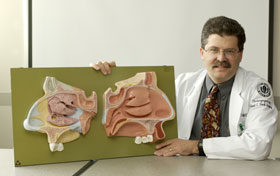Clinic Helps Those Who Have
Lost Sense of Taste, Smell
 |
| Dr. Denis Lafreniere, an ear, nose, and throat specialist, holds up an illustration of the nose at the Health Center’s Taste and Smell Center. |
|
Photo by Peter Morenus |
Imagine life without the smell of fresh coffee, newly mowed grass, or the first backyard barbeque of the season. An estimated 2 million Americans have a smell or taste disorder that prevents them from savoring these pleasures.
The Taste and Smell Center at the UConn Health Center tests, diagnoses, and treats these problems. The center, one of just five in the United States, includes specialists from various disciplines, including internal medicine, neurology, dentistry, and ear, nose and throat, who work together to provide evaluation and treatment.
“Lost or impaired smell or taste is a very serious disorder that puts people at risk for a multitude of health problems, from toxic exposures – such as gas leaks, smoke, or rotting food – to depression and weight loss,” says Dr. Norman Mann, an internist and medical director of the Taste and Smell Center. “The condition also takes away the enjoyment of some of life’s pleasures, like the fragrance of flowers and the taste of delicious foods.”
Although taste and smell are two different senses, both contribute to the experience of flavor, says Mann, adding that 75 percent of the flavor of food comes from smell. When people are unable to smell, they also lose much of their ability to experience flavor.
Mann says viral infections are a common cause of taste and smell problems. “Here’s one more reason to wash your hands frequently, get plenty of rest, and stay healthy,” he says.
Other causes include:
- Nasal disease or obstructions such as polyps
- Upper respiratory infections
- Head injuries
- Neurological disorders
- Dental problems.
At the Health Center, care begins with an evaluation conducted by research assistant Lawrence Savoy in an outpatient dental clinic. During the evaluation, which typically lasts about two hours, patients smell and taste a wide range of substances. Quantitative data generated through the testing help determine the extent of each patient’s loss of taste or smell.
After the initial assessment, patients come back to see Mann; ENT specialist Dr. Denis Lafreniere; neurologist Dr. Morven Barwick; and dentist Dr. Joseph D’Ambrosio. In some cases, more sophisticated testing, such as magnetic resonance imaging, allergy evaluations, or occupational medicine assessments, may be used.
The ENT exam, for example, includes a thorough look for polyps, sinusitis, and other conditions that could affect smell or taste.
After a thorough evaluation, the team recommends treatments, ranging from medications to treat sinus conditions, polyps or bacterial infections, to surgery. For patients whose loss of smell follows an upper respiratory infection, there is no effective therapy. Sensory cells may regenerate, however, Mann says, and the condition may eventually resolve itself.
More information can be found at http://www.uchc.edu/uconntasteandsmell/.

